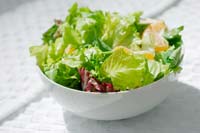Zones Diet Plan Still Attracts Professional Attention
The Zone diet is a high-protein, higher-fat, lower-carbohydrate eating plan. It is not as restrictive as other high-protein diets. It allows for a broad range of foods to be consumed. A small amount of protein is combined with twice the amount of "favorable" carbohydrates, including fruits and vegetables. If choosing "less desirable" carbohydrates, the portion size is smaller. Sears' Zone Diet is based on the theory that the human body is genetically programmed to reach peak efficiency when all meals, including snacks, consist of a set caloric ratio of carbohydrates, proteins and fats. The diet recommends 40% of calories from carbohydrates, 30% from protein, and 30% from fats (40-30-30). When this ratio is achieved, the body is working within the "zone." The body will have maximum energy and weight loss.
Disadvantages:
The medical and nutrition community have mixed feelings about the Zone Diet. There are no long-term randomized scientific studies to support the theory the human body is genetically designed to reach maximum efficiency with a 40-30-30 caloric ratio. The zone diet ultimately is a low-calorie diet. It is difficult to consume essential daily vitamins and minerals naturally from foods on low-calorie diets. Following the Zone Diet over the long term may be difficult.
Advantages:
Weight loss may occur with this diet. It encourages eating balanced meals that include high-fiber fruits, vegetables and beans and grains. The eating plan is easy to follow.
Summary:
While there are many more diets available, these are the ones that seem to generate the most interest and the most questions. We will not even begin to address fad diets such as the " cabbage soup diet" or the " Hollywood diet" etc. There is simply no role for the use of get-skinny-quick fads. They are nutritionally devoid, and frankly dangerous.
Conclusion
Maintaining your ideal body weight is a balancing act between food consumption and calories needed by the body for energy. You are what you eat. The kinds and amounts of food you eat affect your ability to maintain your ideal weight and to lose weight.
Medical science has established that eating proper foods can influence health for all age groups. The U.S. Department of Agriculture's current dietary guidelines state:
"Eat a variety of foods. Balance the food you eat with physical activity--maintain or improve your weight. Choose a diet low in fat, saturated fat, and cholesterol. Choose a diet moderate in sugars. Choose a diet moderate in salt and sodium. If you drink alcoholic beverages, do so in moderation."
Obesity At A Glance. Obesity means having excess body fat. For adults 35 and older, BMI greater than 27 is considered obese. Obesity is not just a cosmetic consideration. It is a chronic medical disease that can lead to diabetes, high blood pressure, heart disease, gallstones, and other chronic illnesses. Obesity is difficult to treat and has a high relapse rate. Greater than 95% of those who lose weight regain the weight within 5 years. Even though medications and diets can help, the treatment of obesity cannot be a short-term "fix" but has to be a life-long commitment to proper diet habits, increased physical activity, and regular exercise.
The goal of treatment should be to achieve and maintain a "healthier weight", not necessarily an ideal weight. Even a modest weight loss of 5%- 10% of initial weight and the long-term maintenance of that weight loss can bring significant health benefits by lowering blood pressure and lowering the risks of diabetes and heart disease. Chances of long-term successful weight loss are enhanced if the doctor works with a team of professionals including dietitians, psychologists, and exercise professionals.
-
Easy Exercises to Lose Weight Fast And Keep It Off!
Obesity is obviously one of the prevalent problems a lot of people
-
Reach Your Weight Loss Goals With These Practical Tips
You may find it difficult to lose weight if you only need to los
-
What is the Better Motivator for Weight Loss?
Quite often we think we are motivated to do something, such as weight
-
Can Skinny People Become Hunks?
So you have been skinny all your life and will do anything to get a fi
-
Boot Camp Trainer Guidelines To Get Better Results In Your New Years Resolutions
I have advised many clients about improving their health, fitness, bod
-
Five Vital Questions To Ask Your Vet
Choosing a vital 5 out of my list of questions to ask your vet abo
- DON'T MISS
- How Can EFT Help Me Lose Weight?
- Understanding Over-weight - How to Successfully Get slim
- Acupuncture Weight Loss Plus 5 Step Weight Loss Plan
- Easy-to-Do Workouts: An Overweight’s 1st Step towards Losing Weight
- New Years Fitness Resolutions Why Do You Set Them Part 2
- Get Skinny Thighs – How To Get Slender Legs Quickly
- Are you still struggling with your weight and living the yo-yo dieting effect?
- Ulcerative colitis (inflammatory bowel disease) causes, symptoms, treatment, and home remedies
- Water
- How To Have Fun With Your Weight Loss




